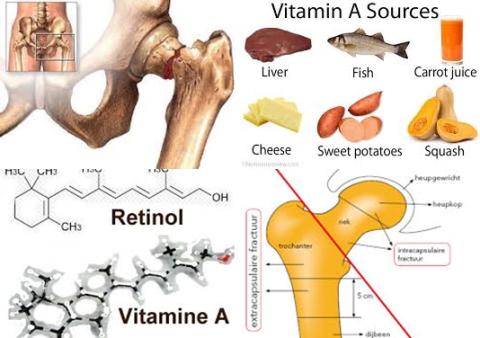
Objectives:
The aim of this meta-analysis (review article) is to evaluate the influence of dietary intake and blood level of vitamin A (total vitamin A, retinol or β-carotene) on total and hip fracture risk?
Study design:
This review article included 11 prospective cohort studies and 2 nested case-control studies, involving a total of 319,077 participants over the age of 20 years (109,056 post-menopausal women).
Results and conclusions:
The investigators found higher dietary intake of retinol significantly decreased total fracture risk with 5% [RR = 0.95, 95% CI = 0.91 to 1.00, I2 = 64.64%, p = 0.04].
The investigators found higher dietary intake of retinol significantly increased hip fracture risk with 40% [RR = 1.40, 95% CI = 1.02 to 1.91, I2 = 30.01%, p = 0.40].
The investigators found higher dietary intake of vitamin A significantly decreased total fracture risk with 6% [RR = 0.94, 95% CI = 0.88 to 0.99, I2 = 35.18%, p = 0.20].
The investigators found higher dietary intake of vitamin A significantly increased hip fracture risk with 29% [RR = 1.29, 95% CI = 1.06 to 1.57, I2 = 0.00%, p = 0.60].
The investigators found lower blood level of retinol significantly increased hip fracture risk with 27% [RR = 1.27, 95% CI = 1.05 to 1.53, I2 = 0.00%, p = 0.62].
The investigators concluded that higher dietary intake of total vitamin A or retinol increases the risk of hip fracture but decreases total fracture risk. Clinical trials are warranted to confirm these results and assess the clinical applicability.
Original title:
The Effect of Vitamin A on Fracture Risk: A Meta-Analysis of Cohort Studies by Zhang X, Zhang R, [...], Chen G.
Link:
https://www.ncbi.nlm.nih.gov/pmc/articles/PMC5615580/
Additional information of El Mondo:
Find more information/studies on vitamin A and elderly right here.
Vitamin A is a generic term for compounds with the biological activity of retinol. Preformed vitamin A (mainly retinol and retinyl esters) is usually found in foods derived from animal products and provitamin A (mainly β-carotene and carotenoids) is usually found in foods derived from plant products.